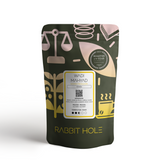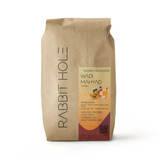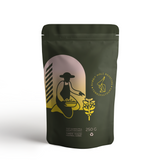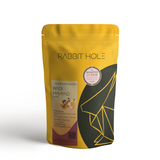Wadi Mahyad - Women Producers
Impressions: papaya, peach cider, elderberry, barley sugar
Roast degree: 2.5/5
Country: Yemen
Governate: Al Mahwit
Village: Wadi Mahyad
Varietal: Yemenia
Process: Alchemy (natural)
Partner importer: Qima Coffee
This is the biggest lot we ever bought from Yemen, and we are so happy to have committed to the community of the Wadi Mahyad village in 2023. Hidden in the mountains of the Mahwit region, this lot is the results of hard work and dedication by a group of 80+ women producers. (also check out the natural lot from the same village)
In Mahwit, eighty percent of the women are directly involved in coffee production. These women handle about sixty percent of the coffee cultivation, a true testament to their vital role in an industry that sustains the community.
Historically, like in many farming communities across the world, these women were confined to secondary roles and their contributions remained largely unrecognized. In recent years, Qima has taken significant steps to support women farmers of the region by introducing focused training programs. They also supported the training of ten female farmers to form a dedicated women’s coffee cooperative. This cooperative represents a turning point, ensuring that the vital contributions of women are formally recognized and celebrated. The cooperative serves as a platform for collaboration, exchange of knowledge and stands as a symbol of the collective resolve of Mahwit’s women.
The Mahwit region is quite cut off and it's hard to find Mahwiti coffee. With the right processing, Qima found the coffee can be excellent and they have been working with smallholders from Wadi Mahyad to access the market with more of their coffees, helping them fetch higher prices (see our transparency report).
Less than three years ago, Qima distributed seedlings in the region and have been interviewing farmers to see how these seedlings were performing. Volumes per tree are up by 50% this year across the community, a great news for farmers!
Mahwit’s journey from neglect to promise testifies to the perseverance, innovation, and community spirit of the region.
Sweet, complex, with a nice mouthfeel and long finish, this is one of the best example of what happens when great farming techniques meat stellar processing.
The coffee felt somewhat fizzy, and reminded Beau, our head roaster, of peach cider. It’s definitely full of stone fruit notes ;-) We also noticed a lot of papaya in that brew.
We also experienced something that does not come on our radar often: elderberry. It’s distinct acidity reminded us of that, but we could have also said red or black currant as well.
The sweetness is very particular: barley sugar. These are typical candy on a stick in Quebec so maybe this will only make sense to us. It’s definitely a sweet coffee though.
The alchemy process from Qima is so interesting. It delivers the most stunning and unique profiles we ever experienced from one of our favorite coffee origin.
With more than 1300 processing experiments, the Alchemy process brings an enhanced sensory experience without compromising the genetic background that make Yemeni coffees so unique.
The process relies on a combination of pressure and temperature control during the fermentation stage, and a close monitoring of the drying protocols to ensure consistency.
For a more classic feeling coffee from the same village, check the Naturally Process Lot!
| Method | Dose | Ratio | Time |
| Espresso | 18 g | 2.2:1 | 26-30 sec |
| Espresso with milk | 18g | 2:1 | 32-36 sec |
| Americano | 18 g | 2.3:1 | 28-32 sec |
|
V60/Origami |
20 g | 16:1 | 3:15-3:45 min |
|
Chemex & Batch Brew |
40-60 g | 16:1 | 4:30-5:30 min |
|
French Press |
18-25 g | 15.5:1 | 3:15 min steep time |
Farmers: Collective lot from the Wadi Mahwad village
Importer: Qima Coffee
Price we paid for the landed coffee at our roastery: 63CAD/kg
FOB price: 42CAD/kg
Farmgate price: 26CAD/kg - 50% above local average.
The difference between the FOB and farmgate price is quite big compared to other coffee origins. Yemen has been at war with Western imperial interests for more than a decade, and it's Red Sea blockade to put pressure on the genocidal entity of Israel (and other world leaders) is making it hard to move goods within the country and even more challenging (and costly) to export coffee.
Qima Coffee also donates 10% of their annual profits to the Qima Foundation, with the money being used for social development programs.








